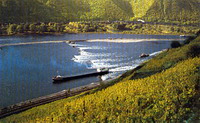Netherlands plan to divert the Rhine
Dutch planning agency proposed diverting part of the Rhine River to an inland lake far from its normal outlet before channeling it to the North Sea.

With much of the Netherlands already below sea level, the Rhine would have an uphill battle to empty into the sea if global warming caused it to rise any higher.
"The level of the ground where the water currently meets the sea at Hoek van Holland (near Rotterdam) is simply too low," said Anneke Oosterhuis, spokeswoman for the Dutch Environmental Planning Bureau.
"With rising sea levels, you would need to pump the water upward at the end, and that's almost impossible," she said.
Instead, Dutch hydraulic engineers should reroute much of the water from the Rhine, beginning far inland, to the Ijssel Lake, where the ground is higher as it approaches the coast.
"In essence, the river's slope will be less steep," she said.
The bureau advises the government on water policy, and its recommendations are a central part of the decision-making process.
Two-thirds of the Netherlands population lives on land below sea level, which accounts for half the country. But experts believe the dunes, dikes and dams that form a barrier to the sea will be strong enough to meet a global warming-induced rise of up to about one meter (yard) with only minor adjustments.
Instead, the country's primary concern is its rivers, which could overflow with sudden surges of water as a result of global warming. Most climate models anticipate more episodes of intense rainfall in the Rhine's cachement area in Germany.
Emergency contingency plans already include earmarking areas for evacuation and intentional flooding of sparsely populated river basins.
The Rhine splits into three parts shortly after it enters the Netherlands near Arnhem. Two-thirds of the water continues west as the Waal River, and most of the rest arches slightly northward toward Utrecht and Amsterdam.
But about one-ninth flows almost due north along the Ijssel River, eventually meeting the Ijssel Lake - once an inlet of the North Sea that was blocked off by a massive dam in 1932, which was then considered an engineering marvel.
The Environmental Planning Bureau's new plan calls for increasing the flow along the Ijssel River, and possibly widening it.
Oosterhuis said the plan was not to "cause panic, but to get people to come to terms with reality. We will have to make major adjustments to cope with global warming."
Subscribe to Pravda.Ru Telegram channel, Facebook, RSS!




